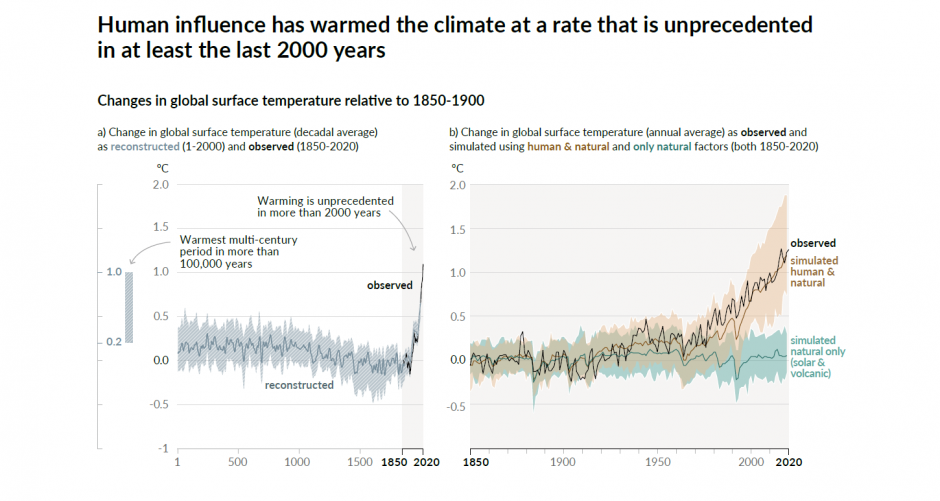New IPCC report reveals urgent need for climate innovation
In The News
09 Aug 2021
The IPCC’s Sixth Assessment Report has launched. The report finds that global warming of 1.5°C and 2°C will be exceeded during the 21st century unless deep reductions in carbon dioxide (CO2) and other greenhouse gas (GHG) emissions occur in the coming decades.
The report also finds that human-induced climate change is already affecting many weather and climate extremes in every region across the globe. These felt effects came into sharper relief for Europeans recently; as of July 2021, several countries have been affected by floods, including the United Kingdom, Austria, Belgium, Germany, Luxembourg, the Netherlands, Switzerland, Croatia and Italy. At least 229 people have died in the floods, including 184 in Germany, 42 in Belgium, one in Italy, one in Austria and one in Romania. Recently, wildfires broke out in Greece over a week-long heatwave and have displaced over 2,000 people.
“The latest report from the IPCC underlines the urgency of action to reverse climate change and regenerate our planet. 2050 is too late. We need to push for net-zero by 2030 to avoid catastrophic climate change effects. For this, we urgently need to accelerate and implement innovation for climate action at all scales and in integrated, holistic ways.” said Kirsten Dunlop, CEO, EIT Climate-KIC. “The risk of not acting is far greater by orders of magnitude than the risk of acting. We have everything to lose by not trying.”
The current state of the climate
- It is unequivocal that human influence has warmed the atmosphere, ocean and land. Widespread and rapid changes in the atmosphere, ocean, cryosphere and biosphere have occurred.
- The scale of recent changes across the climate system as a whole and the present state of many aspects of the climate system are unprecedented over many centuries to many thousands of years.
- Human-induced climate change is already affecting many weather and climate extremes in every region across the globe. Evidence of observed changes in extremes such as heatwaves, heavy precipitation, droughts, and tropical cyclones, and, in particular, their attribution to human influence, has strengthened since the Fifth Assessment Report (AR5).
- Improved knowledge of climate processes, paleoclimate evidence and the response of the climate system to increasing radiative forcing gives a best estimate of equilibrium climate sensitivity of 3°C, with a narrower range compared to AR5.

Figure SPM.1: History of global temperature change and causes of recent warming, Sixth Assessment Report, IPCC, 2021
Possible climate futures
- Global surface temperature will continue to increase until at least the mid-century under all emissions scenarios considered. Global warming of 1.5°C and 2°C will be exceeded during the 21st century unless deep reductions in carbon dioxide (CO2) and other greenhouse gas emissions occur in the coming decades.
- Many changes in the climate system become larger in direct relation to increasing global warming. They include increases in the frequency and intensity of hot extremes, marine heatwaves, and heavy precipitation, agricultural and ecological droughts in some regions, and proportion of intense tropical cyclones, as well as reductions in Arctic sea ice, snow cover and permafrost.
- Continued global warming is projected to further intensify the global water cycle, including its variability, global monsoon precipitation and the severity of wet and dry events.
- Under scenarios with increasing CO2 emissions, the ocean and land carbon sinks are projected to be less effective at slowing the accumulation of CO2 in the atmosphere.
- Many changes due to past and future greenhouse gas emissions are irreversible for centuries to millennia, especially changes in the ocean, ice sheets and global sea level.
Climate information for risk assessment and regional adaptation
- Natural drivers and internal variability will modulate human-caused changes, especially at regional scales and in the near term, with little effect on centennial global warming. These modulations are important to consider in planning for the full range of possible changes.
- With further global warming, every region is projected to increasingly experience concurrent and multiple changes in climatic impact-drivers. Changes in several climatic impact-drivers would be more widespread at 2°C compared to 1.5°C global warming and even more widespread and/or pronounced for higher warming levels.
- Low-likelihood outcomes, such as ice sheet collapse, abrupt ocean circulation changes, some compound extreme events and warming substantially larger than the assessed very likely range of future warming cannot be ruled out and are part of risk assessment.
Limiting future climate change
- From a physical science perspective, limiting human-induced global warming to a specific level requires limiting cumulative CO2 emissions, reaching at least net zero CO2 emissions, along with strong reductions in other greenhouse gas emissions. Strong, rapid and sustained reductions in CH4 emissions would also limit the warming effect resulting from declining aerosol pollution and would improve air quality.
- Scenarios with low or very low greenhouse gas (GHG) emissions lead within years to discernible effects on greenhouse gas and aerosol concentrations, and air quality, relative to high and very high GHG emissions scenarios. Under these contrasting scenarios, discernible differences in trends of global surface temperature would begin to emerge from natural variability within around 20 years, and over longer time periods for many other climatic impact-drivers.
Read the full IPCC Sixth Assessment Report.


